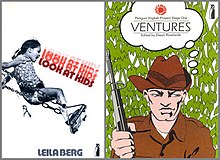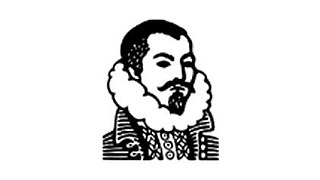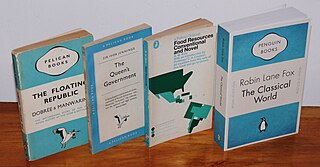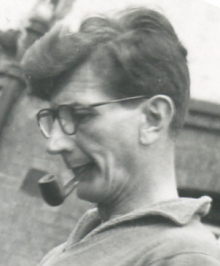Penguin Education was an imprint of the British publisher Penguin Books, running from 1965 to 1974.
Contents
- Early days
- Higher Education titles
- Education specials
- The schoolbook list
- The division closes
- The aftermath
- References

Penguin Education was an imprint of the British publisher Penguin Books, running from 1965 to 1974.

Before the imprint formally came into being, Jill Norman had been hired to do research into higher education and determine trends, so that Allen Lane could decide if this was a market he wanted to get into. She worked at the National Book League, nominally for Allen Lane's friend Jack Morpurgo, the director. Allen Lane chose to keep her year's work on the project from the members of the board until she was able to present them with her report. Penguin Education emerged from this experiment in 1965 and was initially headed by Christopher Dolley as managing director. He was succeeded in 1966 by Charles Clark, who combined the role from 1967 with running Penguin Books' hardback imprint Allen Lane the Penguin Press. The new imprint began by publishing, with Longman, the revolutionary Nuffield Foundation Science Teaching Project, [1] a driver of change in science teaching. Among the other initial projects were the five-volume series A History of Britain, the Learning Mathematics Project, and the Success with English course.
The many series subsequently produced for students in higher education covered a wide range of subject areas, and included the history of science, law and society, the Library of Technology and the Science of Behaviour. Notable and influential best-sellers for this market were Peter Worsley's Introducing Sociology, which became an Open University set book, and James Britton's Language and Learning. For students of literature there were critical anthologies on the work of major writers such as Charles Dickens, Henry Fielding, Henrik Ibsen, Ben Jonson, DH Lawrence, Jonathan Swift and W. B. Yeats; and in the scholarly Penguin English Poets series volumes covering Sir Gawain and the Green Knight, William Wordsworth's The Prelude, Lord Byron's Don Juan, Robert Browning's The Ring and the Book, and the complete poems of John Donne, Samuel Johnson, Christopher Marlowe and Andrew Marvell. The books were marketed by a team based mainly in Harmondsworth, headed by John Hitchin, and given a stylish make-over by the eminent designer Derek Birdsall.
Meanwhile, the imprint's Penguin Education Specials were making a considerable stir. The Hornsey Affair, written by the staff and students of Hornsey College of Art, offered a radical critique of art education, the students’ protest and sit-in there having provoked similar action in other art schools. [2] Warwick University Ltd centred on the student occupation within the university and their uncovering of secret surveillance of staff and students. Edited by E P Thompson and produced at speed in six weeks, the book highlighted issues such as the close links between industry and the universities, and academic and press freedom [3] Other Education Specials focussed on radical ideas from abroad, with books on schooling by American writers and teachers such as John Holt, Paul Goodman, Hebert Kohl, George Dennison and Everett Reimer. Notably influential were the ideas of the Austrian philosopher Ivan Illich in Deschooling Society and the Brazilian Paulo Freire's Pedagogy of the Oppressed. The series also included titles about schooling in Britain, such as The Pre-School Years, Juniors, Education for a Change, Learner Teacher, Young Teachers and Reluctant Learners and The Multi-Racial School. There were books about radical experiments such as R.F. Mackenzie's State School, Leila Berg's Look at Kids, David Wills’ Spare the Child, David Head's Free Way to Learning and Neill and Summerhill: A Man and His Work: A Pictorial Study by John Walmsley; and others on controversial topics such as Peter Newell's A Last Resort? Corporal Punishment in Schools.
In 1967 Martin Lightfoot [4] had been appointed editor of the schoolbook list. The books he commissioned reflected the contemporary move away from didactic instruction towards a shared exploration of ideas between children and teachers. He published Geoffrey Summerfield's Voices and then Junior Voices, beautifully designed poetry anthologies which drew material from a rich and original variety of sources. Making use of the new and affordable integrated litho printing technique, they combined words and images in a visually arresting style. The books were child-centred, and aimed to speak directly to pupils, without any intrusive exercises or other teacher apparatus. Their success led the way for the cutting-edge Penguin English Project, a series of anthologies for the different stages of secondary schools. Its wide range of topics included Identity, Other Worlds, Alone, Cities, and Danger. Mixing high-quality photographs, short stories, poems, play extracts, pictures, drawings, science fiction and cartoons, they providing original material for student exploration and argument. Then came the anthology Story, three volumes of stories and pictures, and Worlds: Seven Modern Poets, comprising photographs of Charles Causley, Thom Gunn, Seamus Heaney, Ted Hughes, Norman MacCaig, Adrian Mitchell and Edwin Morgan, and their objects and environments. Another notable success was Connexions, a series of provocative magazine-style topic books aimed at non-academic teenagers in schools and colleges of further education. Covering topics such as drugs, popular culture, football, relationships, work, food, marriage, shelter, advertising, the law, prejudice, violence and much else, they aimed to stimulate discussion by presenting opposing arguments within these topics, and to connect school education with real life. They were launched by the former Conservative education minister Edward Boyle, a key advisor to Penguin Education. Other published series included Extensions, the Penguin Primary Project, Take Part Books, Listening and Reading, Topics in History, Human Space, and Biology Topic Books (Human Populations by David Hay in the latter series won the 1973 Times Educational Supplement Information Book Award). The production of these books involved an unusually extensive collaboration between writers, editors, designers, illustrators and picture researchers working as an integrated team, an arrangement then rare in schoolbook publishing.
In March 1974 Penguin's owners Pearson Longman decided to close the division, leaving 42 members of staff redundant [5] Although the division had been making a profit since 1970, the school books were discontinued, and the higher education titles and Education Specials transferred to the general operation. The move came at a point of major retrenchment by the company, resulting in significant job cuts across the board, and stringent cutbacks in the number of new titles to be published. Within education there was widespread surprise and alarm at the decision to close down Penguin Education. More than 80 teachers, journalists and leading academics signed a letter to the Times Educational Supplement regretting the death of the imprint. [6] A lead article in the TES on the same day noted: ‘Penguin Education made an impact because of a freshness of approach and design. They also gave intelligent expression to progressive ideas, and developed a personality for their imprint which contrasted usefully with those of their more staid seniors.’
Although attempts to find a buyer for the imprint failed, two publishing cooperatives set up by a few of the redundant employees – Chameleon (editorial) and Ikon (design and picture research) – found homes for certain series. The Penguin English Project dropped the Penguin label and was completed by Ward Lock Educational; Connexions was renamed Standpoints and was continued by Oxford University Press; and further books on education were published by Writers and Readers Publishing Cooperative.
Progressive education, or educational progressivism, is a pedagogical movement that began in the late 19th century and has persisted in various forms to the present. In Europe, progressive education took the form of the New Education Movement. The term progressive was engaged to distinguish this education from the traditional curricula of the 19th century, which was rooted in classical preparation for the early-industrial university and strongly differentiated by social class. By contrast, progressive education finds its roots in modern, post-industrial experience. Most progressive education programs have these qualities in common:
Educational perennialism is a normative educational philosophy. Perennialists believe that the priority of education should be to teach principles that have persisted for centuries, not facts. Since people are human, one should teach first about humans, rather than machines or techniques, and about liberal, rather than vocational, topics.

A textbook is a book containing a comprehensive compilation of content in a branch of study with the intention of explaining it. Textbooks are produced to meet the needs of educators, usually at educational institutions. Schoolbooks are textbooks and other books used in schools. Today, many textbooks are published in both print and digital formats.

Penguin Books Limited is a British publishing house. It was co-founded in 1935 by Allen Lane with his brothers Richard and John, as a line of the publishers The Bodley Head, only becoming a separate company the following year. Penguin revolutionised publishing in the 1930s through its inexpensive paperbacks, sold through Woolworths and other stores for sixpence, bringing high-quality fiction and non-fiction to the mass market. Its success showed that large audiences existed for serious books. It also affected modern British popular culture significantly through its books concerning politics, the arts, and science.

The Bodley Head is an English book publishing imprint of Penguin Random House. Founded in 1887 by John Lane and Elkin Mathews, The Bodley Head existed as an independent entity or as part of multiple consortiums until it was acquired by Random House in 1987 alongside sister companies Jonathan Cape and Chatto & Windus. Random House used The Bodley Head as a children's book imprint until April 2008, when it was repositioned as an adult non-fiction imprint within the Vintage Books division.
Hornsey College of Art, also known as HCA, founded in 1880 as the Hornsey School of Arts, was an art school in Crouch End, part of Hornsey, Middlesex, England. From 1965 it was in the London Borough of Haringey. From 1955 to 1973, when it was merged into Middlesex Polytechnic, it was called Hornsey College of Arts and Crafts. Teaching at Crouch End ceased about 1982.
Founded in 1920, The National Council of Teachers of Mathematics (NCTM) is a professional organization for schoolteachers of mathematics in the United States. One of its goals is to improve the standards of mathematics in education. NCTM holds annual national and regional conferences for teachers and publishes five journals.

Open educational resources (OER) are teaching, learning, and research materials intentionally created and licensed to be free for the end user to own, share, and in most cases, modify. The term "OER" describes publicly accessible materials and resources for any user to use, re-mix, improve, and redistribute under some licenses. These are designed to reduce accessibility barriers by implementing best practices in teaching and to be adapted for local unique contexts.
Thomas Cunningham Nairn was a Scottish political theorist and academic. He was an Honorary Research Fellow in the School of Government and International Affairs at Durham University. He was known as an essayist and a supporter of Scottish independence.

Pelican Books is a non-fiction imprint of Penguin Books founded by Allen Lane and V. K. Krishna Menon. It publishes inexpensive paperbacks of academic topics intended to reach a broader audience. The imprint originally operated from 1937 to 1984, and was relaunched in April 2014.

Democratic education is a type of formal education that is organized democratically, so that students can manage their own learning and participate in the governance of their school. Democratic education is often specifically emancipatory, with the students' voices being equal to the teacher's.

Sir Allen Lane was a British publisher who together with his brothers Richard and John Lane founded Penguin Books in 1935, bringing high-quality paperback fiction and non-fiction to the mass market.
OpenStax CNX, formerly called Connexions, is a global repository of educational content provided by volunteers. The open source platform is provided and maintained by OpenStax, which is based at Rice University. The collection is available free of charge, can be remixed and edited, and is available for download in various digital formats.
Homer Lane (1875–1925) was an American-born educator who believed that the behavior and character of children improved when they were given more control over their lives. Bertrand Russell called him "one of the best men of his generation".
Eklavya is an Indian NGO based in Bhopal, Madhya Pradesh working in the field of education. It was registered as an all India in 1982. The organization is named after Eklavya, the protagonist of a story in the Mahabharat, for his determination to learn even in the absence of a teacher.
The Physical Science Study Committee, usually abbreviated as PSSC, was inaugurated at a 1956 conference at MIT to review introductory physics education and to design, implement, and monitor improvements. It produced major new physics textbooks, instructional movies, and classroom laboratory materials, which were used by high schools around the world during the 1960s and 1970s and beyond.
Foxfire magazine began in 1966, written and published as a quarterly American magazine by students at Rabun Gap-Nacoochee School, a private secondary education school located in the U.S. state of Georgia. At the time Foxfire began, Rabun Gap Nacoochee School was also operating as a public secondary education school for students who were residents of northern Rabun County, Georgia. An example of experiential education, the magazine had articles based on the students' interviews with local people about aspects and practices in Appalachian culture. They captured oral history, craft traditions, and other material about the culture. When the articles were collected and published in book form in 1972, it became a bestseller nationally and gained attention for the Foxfire project.

James Nimmo Britton was a British educator at the UCL Institute of Education whose theory of language and learning helped guide research in school writing, while shaping the progressive teaching of language, writing, and literature in both England and the United States after the Dartmouth Conference (1966) of Anglo-American English educators.

Fifty Years of Freedom: A Study of the Development of the Ideas of A. S. Neill is a 1972 intellectual biography of the British pedagogue A. S. Neill by Ray Hemmings. It traces how Homer Lane, Wilhelm Reich, Sigmund Freud and others influenced Neill as he developed the "Summerhill idea", the philosophy of child autonomy behind his Summerhill School. The book follows Neill's early life and career in rural, Calvinist Scotland and continues through the influence of his mentors, Lane and Reich, and the origins of Summerhill after World War I. Written fifty years from Summerhill's founding, Fifty Years is a sociological and historical analysis of Neill's ideas in the context of intellectual and educational trends both during Neill's life and at the time of publication. Hemmings also surveyed progressive school leaders about Neill's impact on the field and reported their perception of influence on teacher–pupil relations. Fifty Years was first published in England in 1972 by George Allen and Unwin and was later renamed Children's Freedom: A. S. Neill and the Evolution of the Summerhill Idea for its 1973 American publication by Schocken Books.
The Nuffield Science Teaching Project was a programme to develop a better approach to teaching science in British secondary schools, under the auspices of the Nuffield Foundation. Although not intended as a curriculum, it gave rise to alternative national examinations, and its use of discovery learning was influential in the 1960s and 1970s.